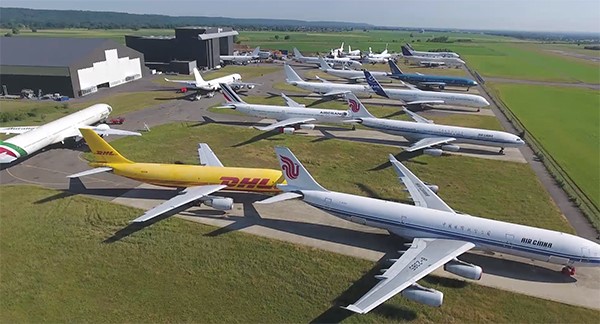您想继续阅读英文文章还
是切换到中文?
是切换到中文?

THINK ALUMINIUM THINK AL CIRCLE

The Covid-19 pandemic is not the solitary reason to turn off the keys for the last time of many aircraft. The rise in the environmental impact of flying is another major reason for putting further pressure on airlines to turn off the engine forever for certain aircraft.

Modern aircraft are much more efficient and the airlines persist that they the performing everything to reduce emissions pollution, the spotlight is shifting to another eco concern.
Early 2000 was the benchmark year when the dying aeroplane was considered to be an issue. The retired aircraft were used to be disposed of like vehicles or crushed or left out for corrosion in uninhabited scrapyards.
However, in 2007, a French firm has developed a solution to the problem and at the same time took the edge of a business opportunity.
A disposed aircraft might be no longer flyable but still, it is filled with components that can be utilised as spare parts for operative aircraft.
Tarmac Aerosave, based across the runway from Tarbes Lourdes airport in Hautes-Pyrénées, is a consortium owned by plane-maker Airbus, and Safran, a high-tech aerospace and aircraft engine manufacturing company, and Suez, which specialises in waste management.
Tarmac Aerosave is the world’s number one for aircraft and engine recycling. When an aircraft reaches the end of its life span, it is flown to Tarbes where expert teams get to work on it.
The team begins with the soft stuff like seats, carpets and other fixtures and fittings and gradually diminish the fuselage to a shell, while engines get special treatment in a hangar set aside for precision dismantling.
The eventual stage is to cut the aeroplane into chunks using a special diamond saw to recover the aluminium and steel.
Every piece of itineraries from seats to the black box is catalogued and preserved ready for resale. The itineraries that be reused is processed for recycling.
In the last 14 years, more than 300 aircraft have been processed in this way. The operation from the aircraft’s final landing to the recycling bin can take as little as two weeks, depending on the size.
Patrick Lecer, CEO, Tarmac Aerosave, said: “We reuse about 60% of the components, all carefully checked by engineers.”
“Altogether, we can recycle 90% of an aircraft. One day, we hope it will be 100%. At present, it is only carbon, foam and some kinds of plastic that cannot be recycled.”
Responses








